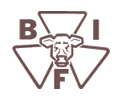FOR IMMEDIATE RELEASE
For a high-resolution photo of the winner, click here (will activate link when photo is available).
For more information contact:
Joe Cassady, executive director, Beef Improvement Federation, North Carolina State University; 919-513-0262; www.BIFconference.com; www.beefimprovement.org
Stephen Hammack Honored with BIF Continuing Service Award
HOUSTON, Texas. (April 19, 2012) — The Beef Improvement Federation (BIF) honored Dr. Stephen P. Hammack with the Continuing Service Award during the organization's 44th annual meeting and research symposium in Houston, Texas, April 18-21. The award recognizes those who have made a significant contribution to the industry.
Dr. Hammack served as the beef cattle specialist for District 8 in Stephenville, Texas, from 1973 until 2003. As a beef cattle specialist, Dr. Hammack's Extension responsibilities were primarily in beef cattle, but included both adult and 4‐H educational activities. His primary areas of interest included animal breeding and genetics, but also included ruminant nutrition, growth and health.
Dr. Hammack served as a beef cattle superintendent for the Texas State Fair, Fort Worth Livestock Show and the Houston Livestock Show and Rodeo for 25 years until his retirement. He continues to attend and collect data on the market steers in Houston, which he summarizes in an annual publication to assist exhibitors in producing a quality product.
Since the 1980s, Dr. Hammack has written a monthly newsletter called Beef Cattle Browsing. This newsletter was initially written as a series of summary articles that Dr. Hammack had read in various research, extension and popular press articles that he thought would be useful and educational to county extension agents in Texas and the Gulf Coast region.
Dr. Hammack decided that a systematic or "ecosystem" approach to improving the genetics of Texas beef cattle was needed. So, in the 1990s he developed an approach he called "Texas Adapted Genetic Strategies." Since then, he has authored 10 of the 11 publications on the topic. The first publication provided an overview of what is required based on goals. The remainder of the series covers environmental effects, milking levels and body size, breeds and breeding systems, expected progeny differences (EPDs), carcass merit, frame size and genetic markers.
In addition, Dr. Hammack annually updates the publication Current Breed Averages for EPD Traits. He is a performance advocate and supportive of bringing new technologies to beef cattle producers to improve their profitability. He was coordinator of the "Animal Breeding and Genetics" session at the annual TAMU Beef Cattle Short Course and was responsible for developing topics, selecting speakers and conducting the session.
Dr. Hammack was the Texas AgriLife Extension official representative to BIF for 20 years, during which he attended annual symposia to provide details on Extension efforts in Texas and to report back on symposium presentations and information shared. He was the Extension co‐host for the 1990 annual meeting in San Antonio and assisted with the 2001 annual meeting (also in San Antonio), both of which were attended by more than 400 beef producers, researchers and Extension faculty.
Because of his experience and knowledge, after his retirement he was awarded "emeritus" status and was re-employed Sept. 1, 2003, in the half-time position in which he continues to serve.
Dr. Hammack was presented the BIF Continuing Service Award at a luncheon Thursday, April 19, in Houston.
For more information about this year's symposium, including additional award winners and coverage of the meeting and tours, visit www.BIFconference.com. For more information about the BIF organization, visit www.beefimprovement.org.
###
Editor's Note: This article is provided as a news release by the Beef Improvement Federation. For a high-resolution photo of the winner, additional award announcements and coverage of the meeting, visit the Awards page at www.BIFconference.com.
The Beef Improvement Federation (BIF) was formed more than 40 years ago as a means to standardize beef cattle performance programs and methodologies and to create greater awareness, acceptance and usage of these concepts of genetic improvement. BIF represents more than 40 state and national beef cattle associations. For more details about the BIF organization, contact Executive Director Joe Cassady at 919-513-0262.



